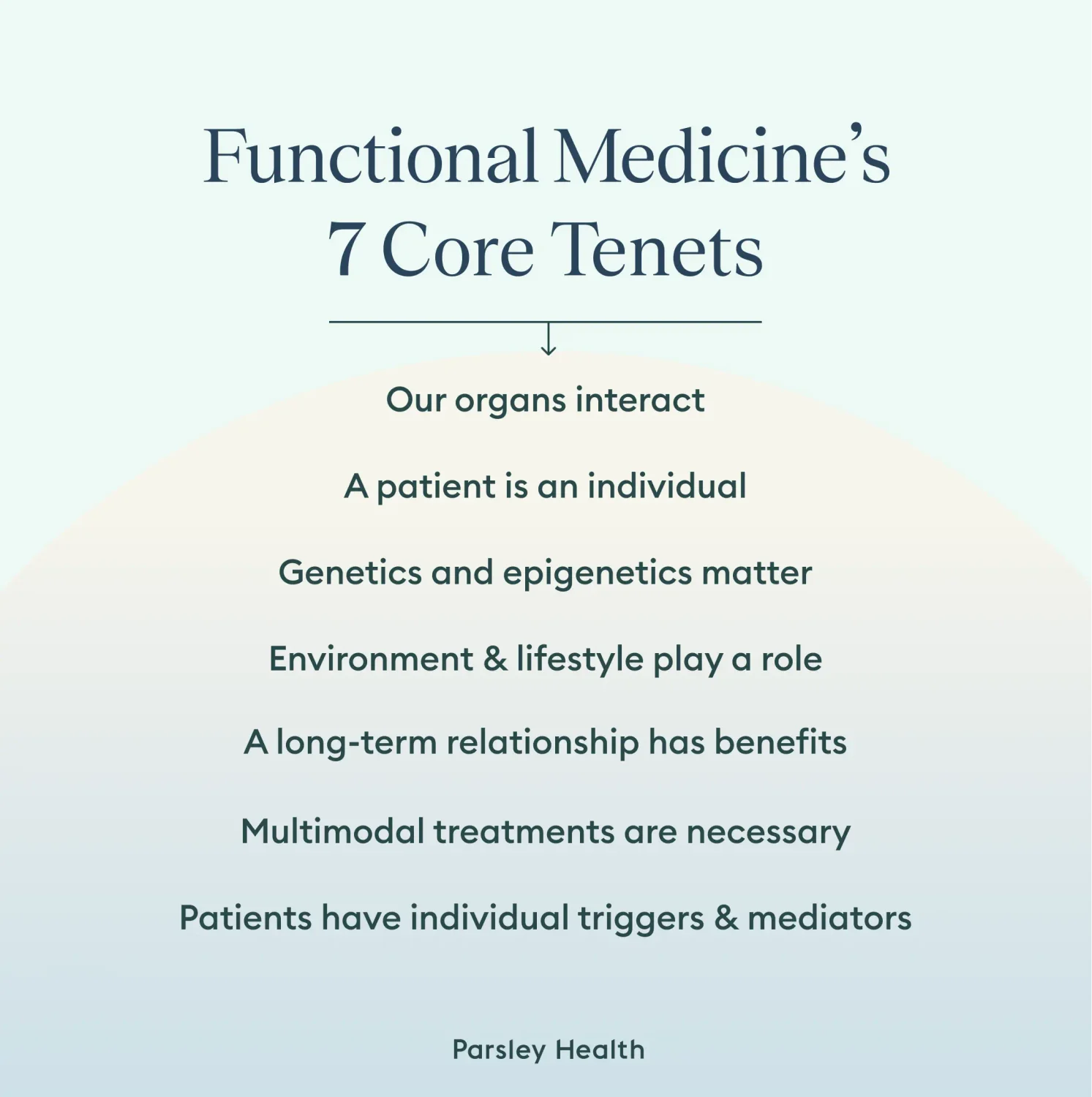Functional medicine is growing in popularity, but many people wonder about its legitimacy and the credentials of its providers. Functional medicine is evidence-based and follows scientific processes while investigating root causes of symptoms and diseases and providing personalized, rather than generalized, approaches to treatment and prevention.
Although functional medicine has been around in some form since the 1800s, it’s been gaining popularity in recent years as patients have desired shifting the focus of their care from treatment of disease to prevention and treating root causes.
“Patients are increasingly seeking care that is personalized, preventive, and proactive,” says Deanna Minich, PhD, the chief science officer at Symphony Natural Health. “Many feel underserved by conventional approaches that focus on disease management rather than wellness optimization. Functional medicine resonates because it emphasizes the therapeutic partnership between clinician and patient, longer consultations, and deeper exploration of root causes.”
If this sounds good to you, you may be wondering, “Is functional medicine legit?” or “Is functional medicine a scam?” The short answers are yes and no, respectively. But to explore this, we need to compare conventional medicine and functional medicine.
Consider this example: I live with a few chronic conditions that I must manage, including mast cell activation syndrome (MCAS), a disorder in which some of my immune cells are overactive and erroneously cause allergic reactions. I require emergency care in the conventional medical system if I experience anaphylaxis, a severe and life-threatening allergic response. But most of the time I can engage in functional medicine care to help avoid MCAS flares and treat their root causes through lifestyle approaches.
Both treatment options are valid and legit. Functional medicine can get the side eye in society as a “woo-woo” approach, but functional medicine practitioners undergo extensive training and focus on evidence-based approaches; they are not “scamming” you when it comes to your health.
In this article we’ll explore what functional medicine is, the credentials of a functional doctor, and more, whether functional medicine is worth it, and more.
What is functional medicine
“Functional medicine is a personalized, systems-oriented approach that addresses the root causes of disease, rather than focusing solely on symptoms,” Dr. Minich says. “To me, it means looking at everyone’s unique genetics, environment, diet, and lifestyle patterns to understand how they interact and contribute to health or disease.”

The Institute of Functional Medicine (IFM), where Dr. Minich is an educator, has a certification program for functional medicine practitioners. It’s a good resource to explore the approach of functional medicine and what it is at its core.
Founded in 1991 by Susan and Jeffrey Bland, PhD, the IFM gives this concise definition: “Functional medicine provides a framework to systematically identify and address the underlying processes and dysfunctions that are causing imbalance and disease in each individual. By understanding a patient’s genetic, environmental, and lifestyle influences, functional medicine clinicians create personalized interventions that restore balance, health, and well-being.”
The term “functional” is, of course, the core of functional medicine, and the concept dates back to the 1800s. “Every symptom arises from the imperfect discharge of function,” wrote Dr. Willoughby Wade in an 1871 article in the medical journal Lancet.
Essentially, when a symptom arises, it originates from a source of dysfunction that, if not addressed, may later turn into a disease state if it hasn’t already. The goal of functional medicine is to target the source of dysfunction and restore function where possible.
“Functional medicine to me means truly addressing the why behind someone’s symptoms (aka getting to the root cause) rather than silencing the pain,” says Natalie Samson, MS, CGC, INHC, a board-certified genetic counselor at Golden Genetics. It’s not about Band-Aid fixes or masking symptoms with prescriptions. It’s about understanding the complex web of how everything in the body is connected, then giving someone a path to actual healing.”
Functional medicine follows seven core tenets:
- Genetics and epigenetics matter. Based on our genetics, we may have some predisposition for certain diseases, but environmental and lifestyle factors can change how our genes are expressed.
- Our organs interact. Although a condition may largely affect a specific organ, our organs are part of larger systems, so treatment involves a whole-body approach rather than a siloed approach.
- Environmental and lifestyle factors play a role. Environmental and lifestyle factors can trigger diseases if they harm health and prevent or even reverse diseases if they are healthy.
- Patients have personalized triggers and mediators. The factors that trigger or resolve symptoms in one person may not be the same for the next.
- Multimodal treatments are necessary. A condition or symptom may require several different treatments, rather than just one.
- A patient is an individual. Because of individualized factors that contribute to symptoms or disease, a personalized approach to care is necessary.
- A long-term relationship has benefits. The personalization process warrants more one-on-one time between patient and clinician.

How functional medicine differs from conventional medicine
Both conventional medicine and functional medicine are valuable forms of care, and one isn’t necessarily superior to the other; in fact, they can even complement each other.
- Conventional medicine focuses on diagnosing and treating diseases with standardized treatments (meaning they apply to most people), which may involve undergoing procedures and taking medications.
- Functional medicine (not to be confused with holistic or alternative medicine), is simply a different way of thinking that takes a root-cause approach to preventing and treating diseases. Functional medicine uses evidence-based personalized (rather than standardized) interventions to address the “why” of what you’re dealing with—not just focusing on the “what” or diagnosis. These interventions may involve lifestyle modifications, supplements, medication if and when needed, and more.
“Conventional medicine has traditionally approached care from a reactive lens, meaning waiting until someone is sick, then treating the symptoms,” Samson says.
Conventional medicine also often takes a generalized or standardized approach, meaning it treats diseases based on what has worked for a large group of people based on clinical trials and other studies. “[This] made sense as medicine scaled and grew and we had to help more and more people, but it doesn’t always fit the complexity of symptoms people are experiencing,” she adds.
“What we now know,” she continues, “especially through genetics, is that no two people are the same. Functional and integrative care honors that individuality. It’s more personalized, more preventative, and rooted in how the body functions as a whole, not just as a set of isolated systems.”
My MCAS situation can help illustrate the differences. The symptoms that first showed up for me included hives and angioedema (facial swelling). Here’s how conventional and functional medicine approached my condition.
- Conventional medicine treated me with antihistamines, medications that block histamine receptors, to prevent the immune system chemicals from causing allergic reactions. This approach was necessary at the time to stabilize me and make me more comfortable.
- Functional medicine, on the other hand, focused on resolving factors that were causing my mast cells to behave erroneously—for example, reducing my exposure to certain chemicals and foods, and focusing on gut health. As a result, I have dramatically decreased my reliance on medications, and my MCAS is largely in remission.
As you can see, conventional medicine treated my immediate symptoms, whereas functional medicine focused on getting to the root cause to help manage or resolve symptoms and prevent condition progression.
“In the end, I always say, it’s not about picking one side and dismissing the other,” Samson says. “It’s about understanding that both models have value, depending on the situation. There’s a time and place for medication and urgent care, just like there’s a time and place for deeper root-cause work.”
She makes an important point about not pitting one method against the other. “The goal should always be the same: to help the person in front of us,” she says. “When we stop asking, ‘Which is better?’ and start asking, ‘What does this person need right now?’ that’s where the real change and healing can happen for our patients.”
Is functional medicine legit? Addressing the skepticism
Now, we get to the common question about the legitimacy of functional medicine.
“Skepticism often stems from misunderstanding,” Dr. Minich says. “Functional medicine is not ‘alternative’ medicine. It is an evidence-informed integrative model that applies cutting-edge research in areas like nutrition, the microbiome, toxicology, and systems biology.”
Functional medicine practitioners use a systems biology approach. Think of assembling a puzzle. You develop the big picture by putting pieces together rather than examining one piece in isolation. And no puzzle is identical. Likewise, functional medicine explores the elements that make up a whole person rather than examining just an individual organ or system to see what might be going on.
Functional medicine often uses “lifestyle medicine” to help. This involves focusing on six categories to prevent, reverse, or treat diseases or symptoms. These interventions are based on science, Dr. Minchin says.
Lifestyle medicine
- Nutrition
- Physical activity
- Stress management
- Restorative sleep
- Social connection
- Avoidance of risky substances
Even though lifestyle medicine is a common approach in functional medicine, functional medicine doctors can also prescribe medications, perform diagnostic tests, and more when needed.
Are functional medicine doctors legitimate?
In a related question about legitimacy, people want to know if functional medicine doctors are “real” doctors and whether they undergo any certification. Indeed, they are and they do.
Functional medicine doctors are fully licensed doctors who have gone through traditional medical school and training before undergoing functional medicine training and certification. Other functional medicine practitioners may have nurse practitioner (NP), physician assistant (PA), or doctor of chiropractic (DC) credentials.
How to find a trusted functional medicine provider
The IFM, not only educates functional medicine providers, it also has a certification program and maintains a searchable list to find those who are certified.
What does the research say about functional medicine?
We can look to research to determine more about the outcomes of functional medicine, which can help you determine if it might be right for you.
For example, a 2020 retrospective study explored outcomes for 109 patients with either a diagnosis of rheumatoid or psoriatic arthritis. About half of the participants underwent a functional medicine program as an add-on to a standard-care approach, while the other half received only standard care.
At the end of 12 weeks, the patients in the functional medicine group reported a statistically significant reduction in pain when compared to the group receiving standard care only.
A larger 2019 study assessed health-related quality of life in more than 7,000 patients by reviewing a score based on a questionnaire about their self-reported physical well-being.
The researchers compared results for more than 1,500 patients who received functional medicine care with results from more than 5,600 patients who received traditional primary care. After six months, the patients receiving functional medicine care showed larger improvements in their physical well-being scores when compared with those treated with traditional primary care.
FAQ
Is functional medicine trustworthy?
Yes, functional medicine is trustworthy. Functional medicine doctors have undergone traditional medical school and training, and functional medicine is based on science.
Are functional medicine doctors actual doctors?
Yes, functional medicine doctors are fully medically licensed. They are doctors who have gone through traditional medical school and training, though they have undergone additional training and certification in functional medicine practices.
Does insurance cover a functional medicine doctor?
Insurance plans vary greatly from one to another. Some plans cover functional medicine, while others don’t. Some functional medicine providers may offer membership fees that help alleviate expenses. And since functional medicine aims to get at the root cause, you may save on healthcare in the long run. (Parsley Health partners with health insurance providers, and you will always know the price of each test or intervention to avoid any surprises.)
What is the difference between functional medicine and regular medicine?
The main difference between a functional medicine doctor and a “regular” or conventional doctor is their philosophy. Conventional medicine doctors treat symptoms and diseases. Functional medicine doctors focus on the “why?” to help get to the root cause to resolve, reverse, or manage the issue. Functional medicine doctors also treat the whole patient, whereas conventional medicine doctors tend to focus on the affected organ or system.
Can functional medicine doctors diagnose?
Yes, a functional medicine doctor has undergone traditional medical school in addition to training in functional medicine. They can diagnose conditions.
Does functional medicine prescribe medication?
Yes, a functional medicine doctor has undergone traditional medical school in addition to training in functional medicine. Their credentials grant them the ability to prescribe medication and other treatments.









